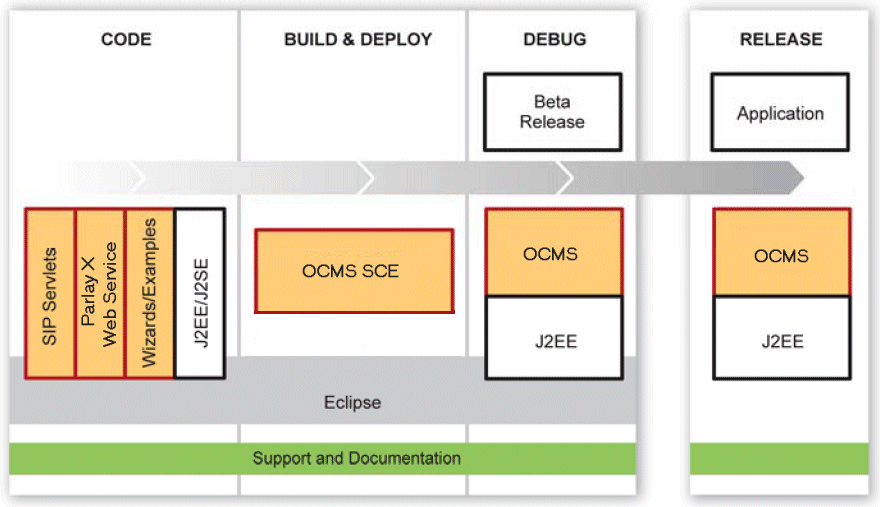| Oracle® Communication and Mobility Server Developer's Guide Release 10.1.3 Part Number E10293-02 |
|
|
View PDF |
| Oracle® Communication and Mobility Server Developer's Guide Release 10.1.3 Part Number E10293-02 |
|
|
View PDF |
This chapter describes application development for the Oracle Communication and Mobility Server (OCMS) in the following sections:
Oracle Communication and Mobile Server (OCMS) is a carrier-grade SIP application environment for the development, deployment, and management of SIP applications. Built on a standard Java2 Enterprise Edition (J2EE) platform, OCMS is a flexible, scalable environment enabling easy integration of SIP applications and services.
Among the applications that may be developed and deployed on SIP platforms:
Voice and video telephony, including call management services such as call forwarding and call barring
Publication of and subscription to user presence information, such as online or offline status, notifications, permission to access a user's status
Instant messaging
Push-to-Talk applications, including Push-to-Talk over Cellular (PoC)
OCMS provides standard SIP applications out-of-the-box, including Presence, a combination Proxy and Registrar (Proxy/Registrar), and a SIP message routing application, the Application Router. An integral part of any SIP platform, these applications are automatically installed to the OCMS platform, reducing development resources and deployment time.
OCMS is distinguished by its standards-based, high performance Presence application which is built according to the OMA/Simple Presence Enabler 1.0. The OCMS Presence application is robust enough to support a significant amount of users, while still being a viable solution for ISVs, system integrators, and enterprises requiring an integration platform and an enterprise Presence Server.
This release of Oracle Communication and Mobility Server includes enhancements and new features. To read about new and improved features, see http://www.oracle.com/technology/products/ocms/otn_front.htm.
The OCMS environment enables you to develop JSR-116-compliant applications through its support of the following:
OCMS supports development of SIP servlets using the JSR-116 SIP Servlet API. Using these interfaces, you can build a SIP Servlet to create customized SIP-based components that terminate SIP messages, send SIP responses, and proxy SIP messages. For an overview of SIP servlets and the OCMS extensions to the SIP Servlet API, see Chapter 2, "SIP Servlets". For an overall view of developing applications in OCMS, see Chapter 5, "Building a SIP Servlet Application".
OCMS supports application development using the Parlay X Presence Web Service interface as defined in Open Service Access, Parlay X Web Services, Part 14, Presence ETSI ES 202 391-14. Using Parlay X interface, you can build a Web Service that acts as a client for many users by providing them functions for publishing, subscribing and listening to notifies. For more information on OCMS support of the Parlay X Web Service interfaces and developing a Web Service using OCMS SCE as the IDE, see Chapter 6, "OCMS Parlay X Web Services". For examples of building a Parlay X Web Service for the Oracle WebCenter 10.1.3.3 platform, see the Oracle Communication and Mobility Server documents on Oracle Technology Network (http://www.oracle.com/technology/index.html).
You can use the Oracle JDeveloper 10g to test Presence Web Services. Oracle JDeveloper Release 10.1.3.3 or higher is the preferred development tool for customers creating applications for the WebCenter 10.1.3.3 platform. For more information on using Oracle JDeveloper 10g within OCMS, refer to Oracle Communication and Mobility Server documents on Oracle Technology Network (http://www.oracle.com/technology/index.html).
OCMS provides OCMS Service Creation Environment (OCMS SCE) as the primary development tool. Oracle JDeveloper is a secondary tool which is used to test Presence Web Services.
OCMS provides the OCMS Service Creation Environment (OCMS SCE), a development tool for SIP servlets and server-side applications. OCMS SCE (SCE), intended for developers on the Windows operating systems, provides tools and APIs for creating services using the OCMS platform. OCMS SCE, which runs on Eclipse, supports your development effort through the Code, Build, Deploy and Debug phases of the development cycle (Figure 1-1).For information on building applications with OCMS SCE, see Chapter 5, "Building a SIP Servlet Application".
Figure 1-1 OCMS SCE Application Development Support
